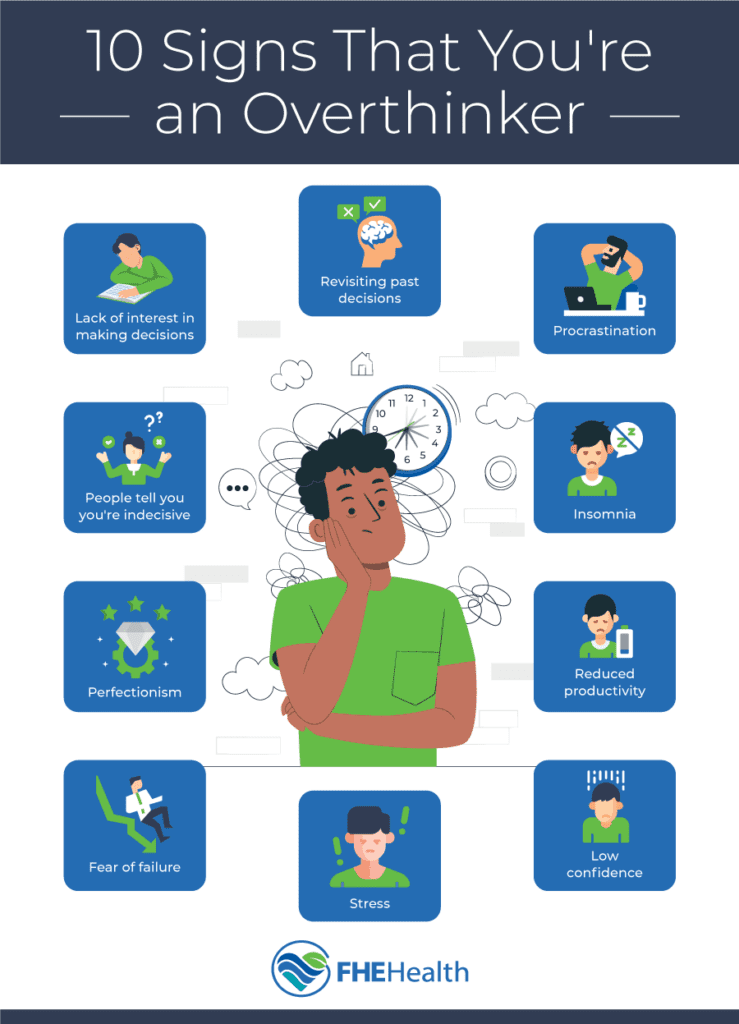
Analysis paralysis is a common form of overthinking. While impulsive decision-making carries its own set of consequences, spending too much time contemplating your options can do more harm than good. Continue reading to learn the signs that you may be overanalyzing your daily decisions and what you can do to be more decisive and self-assured.
Understanding Analysis Paralysis
Analysis paralysis occurs when you spend so much time comparing the pros and cons of your choices that you become overwhelmed and can’t make a decision at all. Many people experience this when they’re presented with many options. Because they want to make the best choice, they feel the need to perform an in-depth comparison between every alternative. Often, the time required to make the objectively best choice doesn’t justify the benefit gained over the many good enough choices.
Analysis paralysis can occur during large and small decisions, and there are a variety of underlying issues that make some people susceptible to this stressful and unproductive exercise.
Signs and Symptoms of Analysis Paralysis
If you’re struggling to make even small decisions, you may be wondering how to know if you have analysis paralysis. Look for the following symptoms:
- Lack of Interest In Making Decisions
After you’ve felt the mental and physical symptoms of overthinking, you may lose interest or avoid making decisions altogether. - Revisiting Past Decisions
Reflecting can be healthy, but when you find yourself comparing the choices you currently face with past decisions, you can easily wind up in analysis paralysis. The idea of making the less-than-ideal choice keeps some people in a continual state of contemplation. - Procrastination
As analysis paralysis typically leads to feeling overwhelmed, some people will find reasons not to make a decision. Procrastinating making a decision can also be the result of the fear of making the wrong decision. - People Tell You You’re Indecisive
If people close to you describe you as an indecisive person, there’s a chance you’re dealing with analysis paralysis on a regular basis. As objective observers, those around us often notice behaviors in ourselves that we don’t realize we have. - Insomnia
People who continually find themselves in analysis paralysis often have trouble sleeping. The thought of making the wrong decision, as well as the ongoing process of analyzing choices, can easily keep you up at night. - Perfectionism
Perfectionism is a common cause of analysis paralysis and overthinking in general. The desire to get the smallest detail exactly right prevents some people from ever completing the task at hand. Even though the details are often inconsequential, some feel the less-than-ideal choice substantially reduces the quality of the final outcome. - Reduced Productivity
When you spend too much time thinking about your choices, you don’t actually take many actions. The diminished productivity isn’t always immediately apparent. When those who overanalyze reflect on how much they actually got done, they may find they spend significantly more time thinking about their choices than making them. - Fear of Failure
Overthinking and fear of failure go hand in hand. The desire to avoid the uncomfortable feelings associated with falling short keeps many people stuck in analysis paralysis. Without taking action, they haven’t failed, so they don’t have to reconcile those unwanted feelings. - Stress
Generally, the more time people spend analyzing their choices, the more stress they bring upon themselves. This stress can be the result of realizing how much time has been spent thinking about a decision without having ever made one, or it can be the result of other symptoms, such as a growing fear of failure. - Low Confidence
Reduced confidence is a common result for people who get stuck in analysis paralysis. As they spend more time going over the potential consequences of their choices, they feel less certain in their ability to make any good decision.
Impact of Analysis Paralysis
The consequences of analysis paralysis are similar to many other overthinking symptoms. When you realize how much time you’ve spent considering your options, you may feel guilty. The more time spent analyzing, the greater the pressure to make the right decision, leading to heightened stress and adding fuel to the fire of this time-consuming cycle.
In the medical world, analysis paralysis among patients can lead to worsening of their illnesses due to their inability to choose a physician for treatment.

Strategies for Overcoming Analysis Paralysis
There are several methods for breaking decision-making paralysis. One or a combination of the following can help you become more decisive and relieve yourself of the negative impact overthinking has on your health.
Set a Timer
Deciding up front the maximum amount of time you’ll spend to make a decision can help focus your thinking and prevent excessive rumination. It’s important to adhere to your timeframe. If you give yourself 5 minutes to decide where you’ll eat dinner, you have to choose once the 5 minutes is up.
Practice Acceptance
Learn to accept that you’re not always going to make the absolute best decision. Consider the consequences of taking no action versus the realistic outcome of what may be the less-than-ideal choice.
Let Go of Perfectionism
Perfectionism can prevent you from ever completing the task. The benefits of getting the minor details exactly correct rarely justify the extra time spent pursuing them.
Know the Finish Line
Decide what completion looks like. This provides you with a roadmap you can reference to ensure you’re moving forward instead of getting stuck in a loop. It also helps prevent perfectionism-based analysis paralysis, as you’ll know that you can move on once the criteria have been met.
Be Mindful
Staying in the moment can help prevent you from getting lost in analysis paralysis. Keep track of how much time you’ve spent weighing your options, and don’t let your imagination run wild when considering the consequences of making the wrong choice.
Consider adopting a structured mindfulness meditation routine. Studies have shown that people who practice mindfulness meditation benefit from reduced stress and anxiety as well as improved sleep. A recent study examined the effectiveness of app-based mindfulness training. After 2 months of consistent meditation, its participants reported diminished feelings of anxiety and worrying, with a 27% average reduction in sleep disturbances.
Seeking Support and Professional Help
In addition to the methods mentioned above, assistance from mental health professionals can expedite your journey of breaking decision-making paralysis. With techniques such as cognitive behavioral therapy, therapists can help guide you to understanding the root cause of your analysis paralysis.
Exposure therapy helps ease people into making quicker decisions, while relaxation techniques remove the feelings of stress surrounding decision-making.
At FHE Health, we know what it’s like to struggle with analysis paralysis. Our licensed therapists can help you understand why you’re overthinking and how to move past it. Contact us today to get started on your journey to becoming more decisive and confident.







